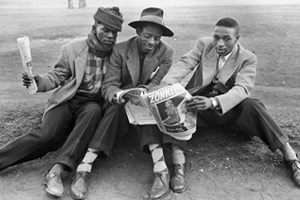There's a larney on my stoep
17 June 2014
English might be only one of 11 official national languages, but the diversity of the country's history and people is coded into its words and expressions. Professor Rajend Mesthrie studies English in its multicultural and multilingual South African context, and has co-authored a book with journalist Jeanne Hromnik: Eish, but is it English?
Bunny chow
From the Chinese word for spicy, 'chow' has come to mean food in South Africa. 'Bunny' probably comes from 'banya', the Gujarati word for a merchant or trader.
Busy
As in 'busy sleeping, dying, relaxing'. The use of this word in South African English is possibly related to the Afrikaans infinitive 'besig om te' ('busy to'). However, there are parallels in international English, especially in ironic or poetic usage.
Dagha
Mud or mortar used in building. It comes from the isiZulu and isiXhosa word 'udaka', which has the same meaning.
Gogga
Slang for any flying insect. It derives from one or more of the Khoisan languages and is widely used in the Cape. It is also the nickname of a well-known former cricketer, Paul Adams, for his unorthodox spin action.
"He threw me with a stone"
Commonly used in Cape Town, more generally by bilingual people for whom Afrikaans is their dominant language. The sentence construction comes directly from the Afrikaans expression, "Hy gooi my met 'n klip".
Larney
Meaning 'posh', 'classy' or 'dressed up', this word is short for 'Hollander', which in the early twentieth century signified an upper-class person dressed in fashionable European styles and distinct from the local 'yokel' or Afrikaner. The words seem to be connected via the intermediate form 'landie', which is still used in parts of Cape Town and Mozambique.
Peri peri
The East African word for pepper, signifying food that is hot and spicy.
Robot
The use of this word for a traffic light has long been discontinued in England, but survives in South African English, from whence it has spread through much of Southern Africa.
Tsotsi
A seSotho word believed to have come from zoot suit, an outfit with narrow stove-pipe trousers worn by American gangsters in the forties and fifties. A tsotsi is a gangster or a wannabe gangster.
Curated by Abigail Calata.
 This work is licensed under a Creative Commons Attribution-NoDerivatives 4.0 International License.
This work is licensed under a Creative Commons Attribution-NoDerivatives 4.0 International License.
Please view the republishing articles page for more information.








